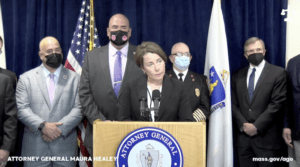Who is a member?
Our members are the local governments of Massachusetts and their elected and appointed leadership.

Maura Healey discusses the state’s lawsuit against PFAS manufacturers during a May 25 press conference. Also joining her were (l-r) Billy Cabral, secretary-treasurer of the Professional Fire Fighters of Massachusetts; Richard MacKinnon Jr., president of the Professional Fire Fighters of Massachusetts; James Vuona, Shrewsbury fire chief and president of the Fire Chiefs Association of Massachusetts; and MMA Executive Director Geoff Beckwith. (Photo courtesy Attorney General’s Office)
Attorney General Maura Healey is suing 13 manufacturers of PFAS used in firefighting foam for contaminating drinking water sources, groundwater and other natural resources with highly toxic “forever” chemicals that pose a serious threat to public health and the environment.
The suit also names two companies that allegedly shielded assets that should be available to remedy the damages caused by contamination from per- and polyfluoroalkyl substances, known as PFAS.
The AG’s complaint, filed today in the U.S. District Court for the District of South Carolina, alleges the manufacturers repeatedly violated state and federal laws protecting drinking water and prohibiting consumer deception by marketing, manufacturing and selling PFAS-containing aqueous film-forming foam (AFFF) to government entities, counties, municipalities, fire departments, businesses and residents in Massachusetts while knowing of the serious dangers the chemicals posed.
“For decades, these manufacturers knew about the serious risks that highly toxic PFAS chemicals pose to public health, the environment, and our drinking water, yet they did nothing about it,” Healey said. “As a result of this deception, our municipalities are spending millions of dollars to provide safe drinking water to their residents.
“I am suing today to hold these manufacturers accountable, require them to pay the growing costs these communities are shouldering, and repair our state’s precious natural resources that have been damaged by these illegal actions.”
Gov. Charlie Baker said he appreciates Healey’s partnership in this matter, adding that the administration has provided more than $110 million in funding to address PFAS contamination, including establishing strict standards for PFAS in drinking water and awarding funding to public water suppliers to help address PFAS contamination.
Energy and Environmental Affairs Secretary Beth Card called the lawsuit a “momentous step.”
MMA Executive Director Geoff Beckwith, who joined Healey for the announcement, said cities and towns across the state applaud the attorney general’s “leadership and resolve to hold PFAS manufacturers accountable for years of harm to our environment, public health and worker safety.
“Municipalities and local taxpayers have been unfairly burdened with the expensive and complex task of removing toxic PFAS chemicals from our groundwater, lakes and streams, and from our public safety workplaces,” he said. “Attorney General Healey’s legal intervention rightly seeks to place that burden squarely on the manufacturers who have caused this harmful pollution and exposure.”
Healey is alleging that the manufacturers’ illegal actions led to the contamination of countless water supplies in Massachusetts, including more than 126 public drinking water systems in 86 communities with serious levels of PFAS contamination, in places such as Chicopee, Weymouth, Abington, Rockland, Cape Cod and Stow. The contamination has required massive efforts by municipalities and the expenditure of millions of dollars to address the threat to public health and the environment.
She says the manufacturers engaged in the design, manufacture, marketing and/or sale of PFAS-containing AFFF used in Massachusetts, which can cause hundreds, if not thousands, of gallons of foamy water laced with PFAS to enter the environment through soils, sediment, surface water and groundwater.
The lawsuit is part of multidistrict litigation that consists of hundreds of lawsuits brought by state attorneys general, municipalities and private and public water districts.
Exposure to PFAS, including through contaminated water supplies, can lead to serious health issues, including decreased antibody responses to vaccines, increased risk of childhood infections, developmental issues for children, decreased birth weight, testicular and kidney cancers, ulcerative colitis, liver damage, and thyroid disease.
Healey also alleges that the AFFF products have caused serious contamination to the state’s lakes, streams and rivers, coastal zones, sediments, soils and submerged lands, and thousands of plant species and diverse wildlife.
The lawsuit is seeking costs to clean up and remove, restore, treat and monitor PFAS contamination and an order requiring the manufacturers to reimburse the state for the damages its products caused. The complaint also demands that the manufacturers remediate and restore the state’s natural resources and pay investigation fees and costs.
The suit is supported by the chairs of the Legislature’s PFAS Interagency Task Force, which released an 88-page report last month outlining a policy framework to protect public health and address environmental concerns and remediation efforts related to the family of chemicals.